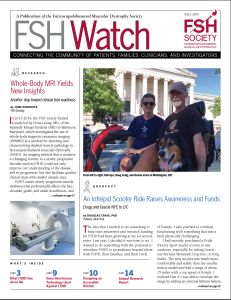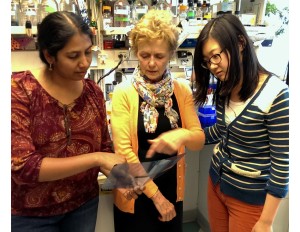 This October we had our first-ever gala in Los Angeles, an incredibly fun Halloween costume ball aptly named “A Ghostly Gala to Vanish FSHD.” There, June spoke of the importance of raising public awareness, because you first must make something visible before you can make it vanish. That’s just Magic 101. But it’s a serious point. How can we make FSHD more visible? One way is to stir up a cauldron of activity. This issue of FSH Watch overflows with reports of our accomplishments:
This October we had our first-ever gala in Los Angeles, an incredibly fun Halloween costume ball aptly named “A Ghostly Gala to Vanish FSHD.” There, June spoke of the importance of raising public awareness, because you first must make something visible before you can make it vanish. That’s just Magic 101. But it’s a serious point. How can we make FSHD more visible? One way is to stir up a cauldron of activity. This issue of FSH Watch overflows with reports of our accomplishments:
- In the annual research report (page 14), we update you on current FSH Society-funded research—projects you are supporting through your gifts. These 18 projects run the gamut of research, from inquiries into fundamental mechanisms to

From left to right, Suja Jagannathan, Lauren Snider, and Qing Feng, members of the Tapscott-Bradley lab. Their research is described in our Annual Research Report. focused searches for drug candidates and development of tools for carrying out clinical trials. Many of these exciting findings were presented at the Society’s annual international research workshop in October; you can read about them on page 6.
- We spotlight three important advances in FSHD research: a first-of-its-kind international study of infantile or early-onset FSHD (page 5), which offers data on the longer-term prognosis for the 4 percent of FSHD patients who develop symptoms in infance or early childhood; a study using magnetic resonance imaging to shed light on FSHD’s impact on muscles throughout the body over time (page 1); and an ingenious use of gene editing technology to shut down the genetic machinery of FSHD (page 6).
-

Marge Brchan’s renovated kitchen Do you love to cook and entertain, but worry about how to make your kitchen safe and accessible? Check out Marge Brchan’s story detailing how she went about renovating her kitchen (page 10). “It was a big investment, but worth it for our long-term health,” she writes. “Being able to do home cooking and entertain family and friends ensures that I’m getting good nutrition and exercise. A well-designed kitchen would allow me to combine all of the components of positive living and a good quality of life.”
Read the full issue of the FSH Watch Fall 2015 (PDF).


Hi
I would like to subscribe to ur news letter as i had fshmd im 53 years old and am struggling to stay mobile enough